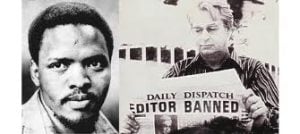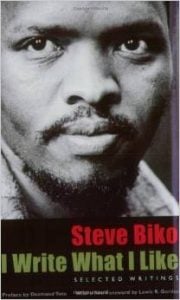” The most potent weapon in the hand of the oppressor is the mind of the oppressed.” – Steve Biko
As is obvious by earlier posts, I hold Steve Biko in hero status as high as almost any other man or woman I’ve studied.
I Write What I Like is a compilation of Steve Biko’s writings and speech transcripts. Steve never collected them intending them to be a book, but after his death, they were assembled and first published in 1978, one year after his horrific and publicized death.
Archbishop Desmond Tutu wrote a forward, interestingly, after he had presided over the first round of hearings of the Human Rights Violations Committee of the Truth and Reconciliation Commission. His preface sets up beautifully what Biko has to say throughout the book: “…I used to say that the Black Consciousness movement was surely of God. You see, the most awful aspect of oppression and injustice was not the untold suffering it visited on its victims and survivors, ghastly as that turned out to be, as the tesimony we have been hearing attests. No, it was the fact that apartheid could, through its treatment of God’s children, actually make many of them doubt whether they were indeed God’s children. That I have described as almost the ultimate blasphemy.”–Archbishop Desmond Tutu
It is this travesty that the Black Consciousness Movement sought to eradicate, to remove the “demons of self-hatred and self-contempt whilst treating fellow blacks as the scum they thought themselves to be.” (Again, Tutu’s words)
Biko’s words: “What Black Consciousness seeks to do is to produce at the output end of the proces real black people who do not regard themselves as appendages to white society. This truth cannot be reversed” (51)
Some of the themes in the book include racism, ethnicism in politics, religion, Black solidarity, among others. Biko covers a wide range of topics, and I can’t cover them all here, but can give you a taste of his ideas. His own words speak better than my summary could do.
He says that since 1652, Africans have experienced “Acculturation.” The two major cultures of concern here are the African Culture and the Anglo-Boer Culture. “Whereas the African culture was unsophisticated and simple, the Anglo-Boer culture had all the trappings of a colonialist culture and therefore was heavily equipped for conquest…Where they could, they conquered by persuasion, using a highly exclusive religion that denounced all other Gods and demanded a strict code of behavior with respect to clothing, education ritual and custom. Where it was impossible to convert, fire-arms were readily available and used to advantage. Hence, the Anglo-Boer culture was the more powerful culture in almost all facets. This is where the African began to lose a grip on himself and his surroundings” (41).
“Wherever colonization sets in with its dominant culture it devours the native culture and leaves behind a bastardizes culture that can only thrive at the rate and pace allowed by the dominant culture” (46).
Biko talks about the individualism of Western Culture and the community-centeredness of African Culture.
Some of my favorite parts are when Steve Biko rants about religion. I wish, oh how I wish some of the mission-minded Lutherans I knew as a child might have read some of this book (though I guess it wasn’t written yet!). He equates colonization with Christianizing, as do many of us. Some of his comments are so succcint, I must quote them.
“It was the missionaries who confused the people with their new religion. They scared our people with stories of hell. They painted their God as a demanding God who wanted worship ‘or else.’ People had to discard their clothes and their customs in order to be accepted by this new religion…With the ultimate acceptance of the western religion down went our cultural values!” (93).
Biko talks about how Blacks are not opposed because they are Xhosa or Zulu or Venda, or Indian, but because they are black. He says that they must use this idea to unite–as all Black people to respond as a cohesive group in a way that would “shock the perpetrators of evil.” (97)
Some of the book contains transcripts of Biko’s interrogations, or recreations of his arrests. His answers and his ability to act with restraint are amazing.
“You are either alive and proud or you are dead, and when you are dead, you can’t care anyway. “I was talking to this policeman, and I told him, ‘ If you want us to make any progress, the best thing is for us to talk. Don’t try any form of rough stuff, because it just won’t work.” If they talk to me, well, I’m bound to be affected by them as human beings. But the moment they adopt the rough stuff, they are imprinting in my mind the that they are police….and I told them this: ‘It’s up to you.’ We had a boxing match the first day I was arrested. Some guy tried to clout me with a club. I went into him like a bull. ..And of course he said exactly what you were saying just now: ‘I will kill you.’ He meant to intimidate. And my answer was: ‘How long is it going to take you?’ Now of course they were observing my reaction. And they could see that I was completely unbothered. It they beat me up, it’s to my advantage. I can use it. They just killed somebody in jail–a friend of mine–about ten days before I was arrested. …..So I said to them, ‘Listen, you guys want to do this your way, you have got to handcuff me and bind my feet together, so that I can’t respond. If you allow me to respond, I’m certainly going to respond. And I’m afraid you may have to kill me in the process even if its’ not your intention.'” (152-153).
So, I have so many sections of this book marked and highlighted, that what I really want to do is copy and paste in huge sections. Nothing conveys Biko’s ideas better than his own articulate words. I hope this conveys a sense of his intelligence and foresight.
The section above about where Biko asks the police how long will it take them to kill him, and when he says that he’s afraid they may have to kill him in the process, he was perhaps clairvoyant, but more likely, he understood how the political and police power worked, and it was simply true. Donald Woods sneaked into the morgue to take pictures of Biko’s dead body to negate the silly excuse that he had died from a hunger strike.
Write What I Like reflects Biko’s conviction that black people in South Africa could not be liberated until they united together and changed their mindset of servitude and inferiority. Those were the key tenets I gleaned from this book, and from reading about the Black Consciousness Movement.
Biko, Steve. I Write What I Like: Selected Writings. University of Chicago Press, 2002.





Subscribe To Rebecca'sNewsletter
Join the mailing list to receive the latest news and updates from Rebecca.
You have Successfully Subscribed!